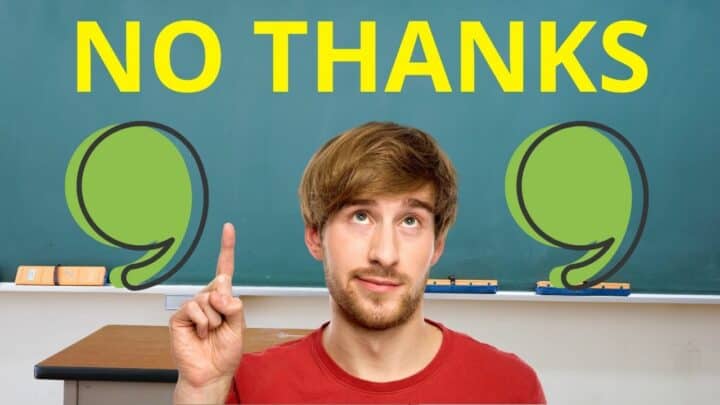One reason commas can be confusing is because just when you think you’ve learned a rule you can apply consistently, you find out there are exceptions.
This is the case with the phrase “no thanks.” Do you need a comma after the “no” or not?
There are a few different ways to think about this, and we’ll get into all of them below!
How do you punctuate the phrase “no thanks”?
Most of the time, you do not need a comma between “no” and “thanks.” However, if you want to emphasize a pause, you might want to use one. “No thanks” should never have a comma when it is used to mean someone did not help you or as part of the expression “thanks, but no thanks.”
Why don’t you need a comma in “no thanks”?
In general, when a sentence starts with “yes” or “no,” you would need a comma after those words. Here are a couple of examples:
Yes, the museum is open today.
No, we don’t have any strawberries.
Although grammatically it might seem like “no thanks” would be handled in the same way, these two words together in this way act as a unit instead of two separate words.
For that reason, they usually are not separated by a comma.
“No thanks” is often its own sentence the same way that “yes” or “no” can be, but it softens saying just “no,” which can sometimes sound rude:
Do you want any lemonade?
No thanks.
In a sentence like the one below, “no thanks” acts an introductory phrase, so it is followed by a comma:
Do you want any lemonade?
No thanks, I’m having water instead.
When “no, thanks” might need a comma
When to use a comma is not always straightforward. “No, thanks” is one of those constructions where this is the case.
If you want to indicate a pause between “no” and “thanks,” you could use a comma.
A comma, which draws out this phrase a little more, would suggest some hesitancy or regret on the part of the speaker:
Do you need a ride home?
No, thanks. I think my dad is coming to pick me up.
In the above example, the speaker is pretty sure their dad is coming to pick them up, but the pause means that they aren’t 100% sure, and they may have considered accepting the offer of a ride.
Here’s another example, with the speaker suggesting regret because they would like to join their friends at the beach, but they really can’t afford it:
Do you want to come to the beach with us?
No, thanks. I don’t really have any money!
Notice one thing about the two above examples.
In both of them, “no, thanks” is followed by a period instead of a comma when there is more to the sentence.
“No thanks” needs to be its own sentence here because adding another comma after it would make the entire sentence look choppy.
This is another common usage of “no thanks.”
It is somewhat impolite, even sarcastic, and it is a way of telling the other person that you definitely don’t want whatever they have offered you.
There could be many reasons for this, but one common implication is that what the person has offered is very inconsequential compared to what is needed.
Another is that the person offering has already made the situation worse, and the person refusing simply wants nothing more to do with them.
For example, maybe Katya has just spilled paint all over her brother’s school project.
When she offers to help him clean up, he might say, “Thanks, but no thanks.”
With this construction, there should never be a comma between the two words.
When “no thanks” is followed by “to”
“No thanks” can also be used in a sentence to express that a person did not do anything to help a situation. In some cases, it may imply that the person made the situation even worse.
When you see it used in this way, there should never be a comma between the two words.
Here’s an example:
This sentence means that Mary did not help them do their homework. She might even have distracted them in some way.
Here are a few more sentences:

Hey fellow Linguaholics! It’s me, Marcel. I am the proud owner of linguaholic.com. Languages have always been my passion and I have studied Linguistics, Computational Linguistics and Sinology at the University of Zurich. It is my utmost pleasure to share with all of you guys what I know about languages and linguistics in general.

